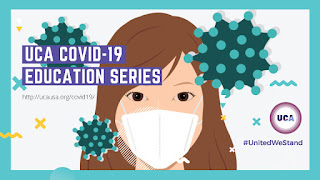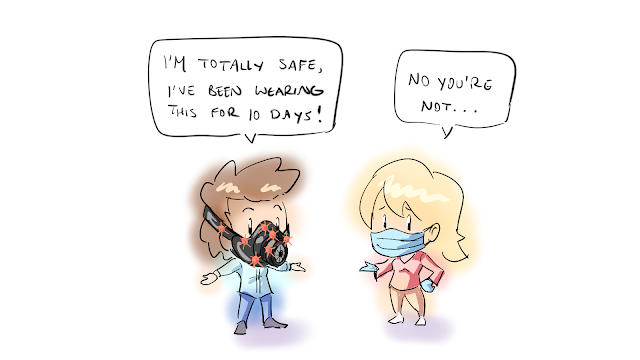46: Gas Masks vs. Disposable Masks
Q: Can gas masks protect against COVID-19? Are they better than disposable masks?
💁Tracy: With effective disinfection and frequent filter replacement, a gas mask can effectively prevent the spread of airborne respiratory droplets. Compared with disposable masks, gas masks have the following advantages:
But it also has one principal disadvantage: in actual use, many people cannot completely disinfect it or replace the filter in timely fashion. If you use a gas mask frequently without taking adequate precautionary measures, you may in fact be increasing your chances of infection. Also, gas mask can look very intimidating and does not appear friendly in the public.
Q: Which type of gas mask should I choose?
💁Tracy: There are two types of gas masks, distinguishable by their shape, currently available on the market: half face and full face.
Q: What should I look for when buying a gas mask?
💁Tracy: Pay attention to the following two things when purchasing:
Filters and canisters are classified according to their efficiency in filtering airborne particles. This is where N95 and other designations that you may have heard come in. N95 means that the filtration efficiency for non-oily particles is at least 95%, which is enough for ordinary purposes. R95 and P95 are higher rated than N95, and can filter both oily and non-oily particles with 95% efficiency or above. Specifically, R95 has a certain filtering effect on oily particles, and can last for 8 hours; and P95 has a very good filtering effect on oily particles, and can last for 40 hours.
Q: I’ve heard a lot about military masks. Are they the safest?
💁Tracy: Military gas masks mainly target certain chemicals. The substances in the canister usually react with and convert toxic chemicals into non-toxic ones. But such filters are not effective on viruses.
As for preventing airborne droplets, many military gas masks do not have particularly strong particle filtration efficiencies. Even if one is sufficient for filtering particles, a military gas mask canister generally has a service life of only a few hours. Therefore, military gas masks are no more advantageous than face masks and the regular gas masks with filters mentioned above.
On the other hand, the contents in the canister of a military gas mask may be toxic. Opening one up without knowing what’s inside may cause poisoning. So, buying military gas masks is not recommended.

💁Tracy: With effective disinfection and frequent filter replacement, a gas mask can effectively prevent the spread of airborne respiratory droplets. Compared with disposable masks, gas masks have the following advantages:
- Airtight fit: The shape and materials used along the edges of the gas masks make them conform and adhere better to the face.
- Budget-friendliness: Filters are less expensive than disposable masks, so over long periods of time, gas masks tend to be more economical than disposable ones.
But it also has one principal disadvantage: in actual use, many people cannot completely disinfect it or replace the filter in timely fashion. If you use a gas mask frequently without taking adequate precautionary measures, you may in fact be increasing your chances of infection. Also, gas mask can look very intimidating and does not appear friendly in the public.
Q: Which type of gas mask should I choose?
💁Tracy: There are two types of gas masks, distinguishable by their shape, currently available on the market: half face and full face.
- If you want to comprehensively prevent the spread of airborne droplets, choose a full face gas mask for better protection.
- Most people do not frequently visit hospitals or other areas of high virus density, so eye cover is not as necessary. A half face mask with the same filter or canister installed will have a protective effect in day-to-day life.
- An additional consideration: if you use public transportation, a forehead thermometer may be used to measure your body temperature at station security check points. If you wear a full-face gas mask, you would have to take it off, exposing you to crowded places, and possibly contaminate the inside of your mask. Therefore, if you use public transportation such as air flights frequently, full face masks are not recommended.
Q: What should I look for when buying a gas mask?
💁Tracy: Pay attention to the following two things when purchasing:
- Guaranteed airtightness.
- The filtration efficiency of the filter / canister (please carefully read the product specifications).
Filters and canisters are classified according to their efficiency in filtering airborne particles. This is where N95 and other designations that you may have heard come in. N95 means that the filtration efficiency for non-oily particles is at least 95%, which is enough for ordinary purposes. R95 and P95 are higher rated than N95, and can filter both oily and non-oily particles with 95% efficiency or above. Specifically, R95 has a certain filtering effect on oily particles, and can last for 8 hours; and P95 has a very good filtering effect on oily particles, and can last for 40 hours.
Q: I’ve heard a lot about military masks. Are they the safest?
💁Tracy: Military gas masks mainly target certain chemicals. The substances in the canister usually react with and convert toxic chemicals into non-toxic ones. But such filters are not effective on viruses.
As for preventing airborne droplets, many military gas masks do not have particularly strong particle filtration efficiencies. Even if one is sufficient for filtering particles, a military gas mask canister generally has a service life of only a few hours. Therefore, military gas masks are no more advantageous than face masks and the regular gas masks with filters mentioned above.
On the other hand, the contents in the canister of a military gas mask may be toxic. Opening one up without knowing what’s inside may cause poisoning. So, buying military gas masks is not recommended.
References
[1] https://blogs.cdc.gov/niosh-science-blog/2009/10/14/n95/
[2] https://www.cdc.gov/niosh/npptl/topics/respirators/factsheets/respfact.html
[2] https://www.cdc.gov/niosh/npptl/topics/respirators/factsheets/respfact.html
[6] Samy Rengasamy, Benjamin C. Eimer, Ronald E. Shaffer, Comparison of Nanoparticle Filtration Performance of NIOSH-approved and CE-Marked Particulate Filtering Facepiece Respirators, The Annals of Occupational Hygiene, Volume 53, Issue 2, March 2009, Pages 117–128
Writing: Yuehan Wu; Translation: Xiaoming Dong; Proofreading: Helen Shih, Peter Hu; Artwork: Peter Hu








